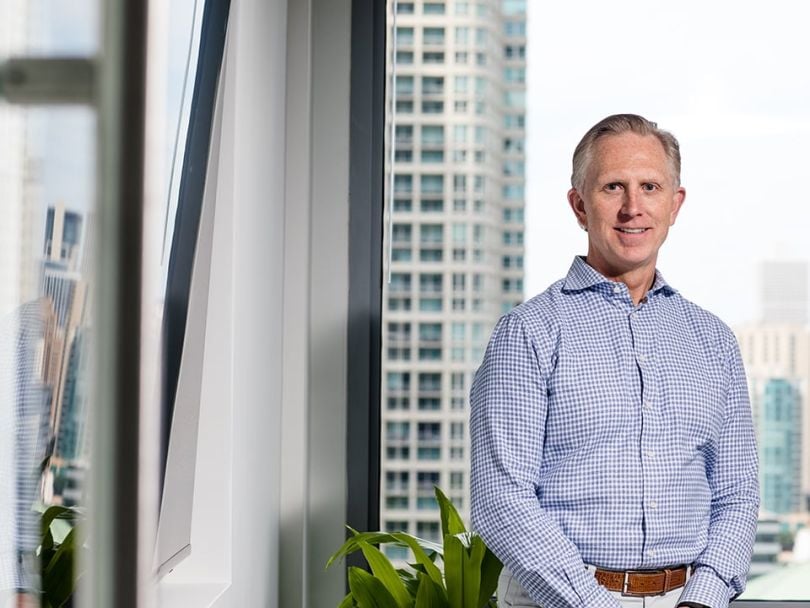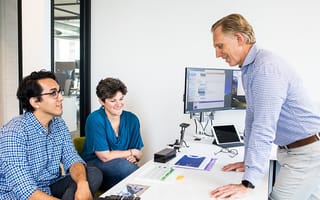Having pivoted from a hardware business operating under a different name to a cybersecurity company with a foot in the global financial services market, OneSpan has never shied away from adapting to meet customer demands. But throughout its journey, the company has remained firmly attached to a culture of innovation and agility.
It’s these values that CEO Scott Clements emphasizes as he leads OneSpan to increase its global footprint and roll out its next generation of cloud solutions. We spoke with Clements to learn how his experiences living abroad and selling tech solutions help sharpen his vision for the company’s future — as well as what makes him confident a new hire is the right addition.


FOUNDED: 1991
EMPLOYEES: 675 (50 locally)
WHAT THEY DO: OneSpan is a cybersecurity company that helps organizations make advances in their digital transformations by establishing trust in people’s identities, the devices they use and the transactions that shape their lives.
SIGNIFICANT CLIENTS: IBM, HSBC and BMW
TRANSFORMATION COMPLETE: OneSpan, formerly VASCO, used to be a hardware company but has since transitioned into a software company.
GOING GLOBAL: OneSpan's team collaborates with one another around the world. Learn more.

Scott Clements, CEO and President
Scott Clements sets and communicates OneSpan’s global vision and company culture. He also manages resources and explores innovative solutions to improve the company’s performance in the eyes of customers, employees and shareholders.
BEYOND WORK: Nothing clears Clements’ mind like spending time in nature, especially when physical fitness is involved. He also follows politics and public policy to remind himself that there are things of much greater importance than his individual experience.
Talk to us more about your background before OneSpan. How have those experiences affected your leadership style?
Working for all sizes of companies, from startups to multibillion-dollar corporations, has shaped my way of thinking about how business is done. Tactics like applying a startup mentality to large companies is a good example, because even giant corporations have to innovate and grow — they’ll often even have startup projects within. Applying this approach has given me a broad perspective and a unique way of thinking about strategy.
You previously worked in tech sales. How has that experience helped you to develop the skills you use today?
That was a formative period for me because I realized that the ability to sell was going to be important no matter my role in a business. People who are successful in their careers, especially executives, have to constantly sell ideas, concepts and strategies to a variety of audiences, including management, their board, customers and technology partners. The ability to sell, especially within the technology domain, is a basic and necessary skill in any role. I recommend everyone learn to do it.
It’s a core capability for leaders to be able to create and communicate a compelling vision.”
Tell us about a moment in your company’s history that made you proud to be its leader. How did that moment reflect the values you’ve instilled there?
When I joined what was then called VASCO, it was a hardware company in need of a new path. The company had been successful for a long time, but a changing security market required that it move toward being a software company. When a business needs something new — new solutions, new products, a different perspective on the future — it requires an evolution of the entire value chain within an organization.
I’ve been in this situation before, so I could envision the path, even if I didn’t have all the answers. My ability to see and sell the vision became exceedingly important in engaging the team of people needed to drive the change. We had to break down silos and cultural assumptions and build up a new energy and excitement about the company’s future. Today, half of our revenue now comes from software and services and the company is growing again.
We know you’ve lived abroad. Where did you live and how has this global perspective influenced your leadership?
I lived for more than a decade in both Hong Kong and Switzerland and both experiences taught me humility, an important trait to have when working in countries and cultures that aren’t your own. The things you learn in the U.S. and in business school don’t always work the same way abroad, so you need to have an attitude of curiosity. It’s important to ask questions to uncover why people do what they do and why the business runs as it does. That way, you put aside your assumptions and learn how things are actually done.
Living abroad also taught me the agility and flexibility required when managing a large organization made up of people from different cultures. Managing across the different cultures at OneSpan requires me to be open and not assume I know the answer based on what has worked in the past.


How critical do you think communication is to the success of a leader?
It’s a core capability for leaders to be able to create and communicate a compelling vision in different ways and at different touch points. Authenticity in that communication is extremely important, and that comes with communicating clearly and honestly and through dialogue that evolves the vision with other insights. A leader’s credibility gives their vision credibility.
What’s a major challenge facing the cybersecurity industry? What are you doing to help your company overcome it?
The cybersecurity industry has failed its customers. You can’t listen to the news these days without hearing about a data breach, and all the industry data shows the problem continues to worsen every year. Identity fraud is big business for hackers, especially with an increasing number of transactions moving online, and the threat vectors are ever-changing.
To counteract this, the industry needs a more dynamic approach to identity security and authentication, which is why OneSpan recently introduced its agile and open Trusted Identity (TID) platform. It’s hard for organizations to battle identity fraud without being able to adapt quickly, which is just what TID enables.
What’s next for OneSpan?
OneSpan will likely transition from a software-based offering to a services offering, which will allow our customers to consume identity verification and authentication in simple and cost-effective ways. Given the increasing volume of digital transactions, being able to keep up and excel in the delivery of security-as-a-service will require a concerted effort by the company and its people to be increasingly agile.
What will you expect of your employees to get the company there?
From a technology standpoint, this will impact all of our internal systems and how we manage our platforms to ensure our solutions are highly secure and constantly available. From a personnel and cultural standpoint, it will mean having the ability to learn new skills quickly, the ability to work as part of a cross-functional and global team to develop new capabilities, and the flexibility that comes from strong intellect and collaboration.
Culture is not static, and we want people who can constructively drive change as well as adapt their style of work.”
When it comes to new hires, how do you know you’ve found a good cultural addition?
We are always looking to see whether someone can demonstrate how they have worked collaboratively in an agile way with the mindset of taking ownership and responsibility for their outcomes. They don’t have to be an exact fit, but there needs to be evidence of that adaptability and relevant experience to give us confidence they can both come to fit our culture and be part of its evolution. Culture is not static, and we want people who can constructively drive change as well as adapt their style of work.




